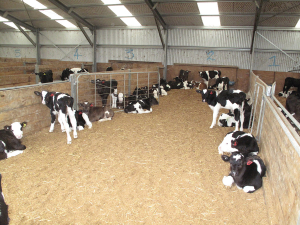NZ Catchment Groups Thrive with ‘Source to Sea’ Approach
The most successful catchment groups in NZ are those that have 'a source to sea' approach.
 A farmer has been disqualified from owning calves for two years after a large number of calves he was raising died.
A farmer has been disqualified from owning calves for two years after a large number of calves he was raising died.
A Canterbury farmer has been disqualified from owning calves and fined $26,000 following the death of a large number of calves he was raising.
Additionally, John Yi Jiang, aged 62, was fined $24,000 for NAIT offences.
Jiang was sentenced on Friday last week in the Christchurch District Court on two charges he pleaded guilty to under the Animal Welfare Act after a successful prosecution by the Ministry for Primary Industries (MPI).
He was also ordered to pay vet costs of $5,523. The disqualification is for two years and includes calves under the age of six months.
“These calves were being raised in sheds with poor ventilation, suffering from heat stress and dehydration, along with showing signs of disease and scouring. 19 calves had to be euthanised during our first visit,” says MPI regional manager animal welfare and NAIT compliance Murray Pridham.
Jiang, who is also an alternative medicine practitioner was using lavender extracts as a health supplement for sick animals, stating it worked well on humans and he believed it would work on animals too.
“While lavender might have health benefits for people – these were agricultural animals and they require specific antibiotics and veterinarian treatment to manage or prevent illness or disease which he failed to do,” says Pridham.
After receiving a complaint, MPI Animal Welfare Inspectors and veterinarians examined the calves on 31 August, 2020. Tests on live animals found many were suffering from rotavirus, cryptosporidium, and salmonella. If not treated, all these illnesses include diarrhoea as a symptom and can lead to death from dehydration. Antibiotics were provided to some of the ill calves during this visit and their health began to improve.
Jiang had been housing 454 calves in pig sheds, which were mostly cared for by a contractor with no experience in calf rearing.
MPI Animal Welfare inspectors euthanised another 21 calves on 1 September to end their suffering. A large compost area was also discovered at the farm containing the remains of an unknown number of calves. Many showed signs of having suffered diarrhoea at the time of death.
MPI concluded that at least 74 calves had died before it intervened, and Jiang told MPI that 194 other animals that arrived on the farm between late July and late August were in ‘the pit’ or compost area.
“All of these deaths could have been prevented if Mr Jiang had done the right thing. Most people in charge of animals know their responsibilities, understand their animals’ welfare and nutritional requirements, and provide timely medical attention from a veterinarian. Mr Jiang seriously failed these animals,” says Pridham.
MPI says they strongly encourage any member of the public who is aware of animal ill-treatment or cruelty to report it to the MPI animal welfare complaints freephone 0800 00 83 33.
In a separate matter, Jiang has also been fined $24,000 on three charges under the National Identification and Tracing Act 2012. The law requires people in charge of deer or cattle to tag and register their animals in the national database and report any deaths to MPI. This is to ensure traceability in the event of a possible biosecurity problem occurring at a farm.
Jiang had 69 NAIT animals die which he did not declare as required. He also failed to declare the movements of 286 NAIT animals onto his farm, along with failing to register 6 other animals with NAIT.
Amendments to penalties in the NAIT Act, which increased the maximum penalty tenfold to $100,000 in late 2019, send a strong message that people need to treat this scheme very seriously.
People in charge of animals who are unsure about what they need to do should visit the OSPRI website for details.
Voting has started for the renewal of DairyNZ's milksolids levy.
The most successful catchment groups in NZ are those that have 'a source to sea' approach.
Associate Agriculture Minister and Manawatu dairy farmer Andrew Hoggard says the free trade agreement (FTA) negotiated with India is not a bad deal and his party, Act, will support it when it goes before Parliament.
Newly released data from Environment Canterbury (ECan) Farm Environment Plan (FEP) audits are showing a dramatic lift in environmental performance across the region.
A solid recovery of global dairy prices this year makes a $9.50/kgMS milk price almost a shoo-in for this season.
As New Zealand marks the United Nations’ International Year of the Woman Farmer 2026 (IYWF 2026), industry leaders are challenging the misconception that women only support farming.